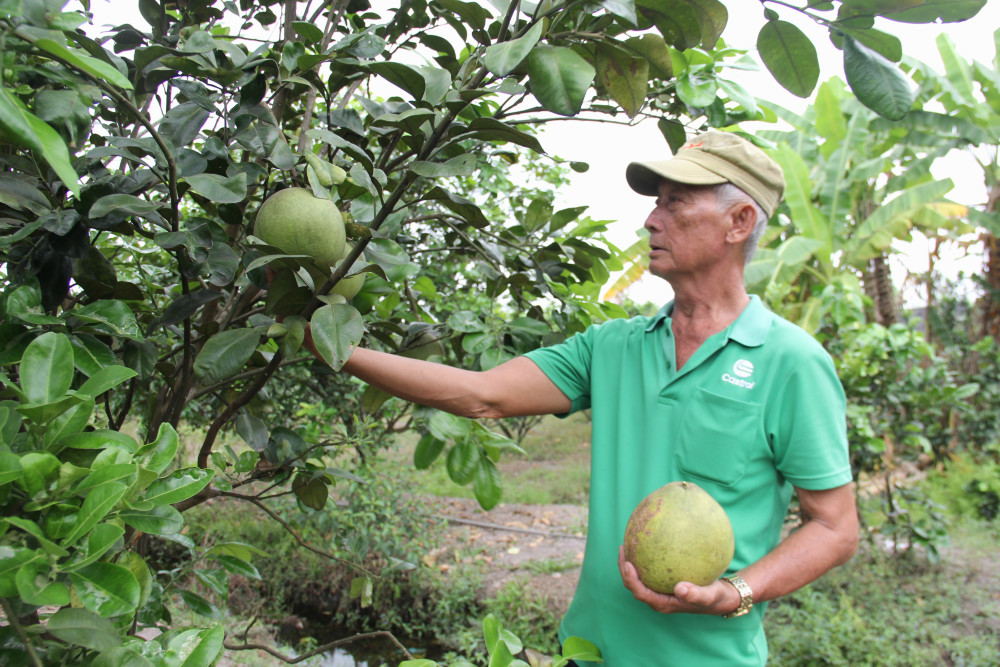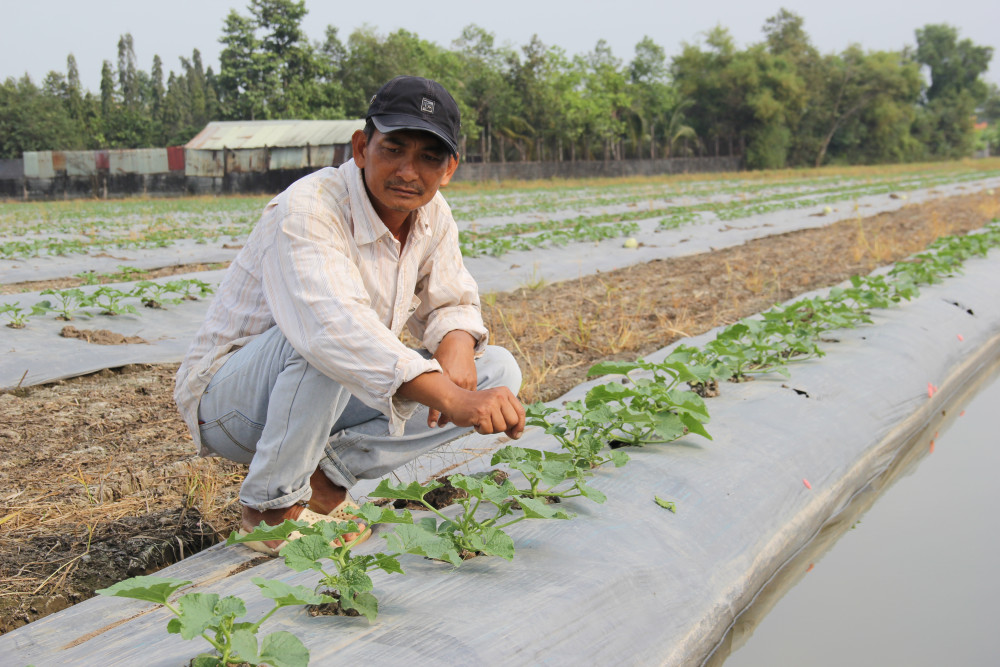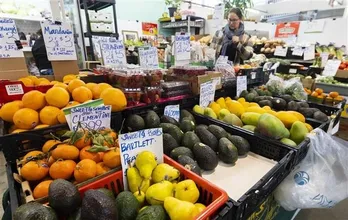1. When we called Mr. Nguyen Van Sang (Hamlet 1B, Huu Thanh Commune, Duc Hoa District, Long An Province) to write about his Ruby pomelo growing model, he immediately agreed and enthusiastically gave us directions. He wanted his pomelo garden to be known by many people so that they could learn from it and develop their family economy. "There is no need for advertising, because in the village people do not have enough to sell" - Mr. Sang said.

Switching from growing lime to pomelo, Mr. Nguyen Van Sang (Hamlet 1B, Huu Thanh Commune, Duc Hoa District) has a more developed economy
Previously, Mr. Sang grew rice and lime. When the price of lime dropped, he discussed with his second son about switching crops.
Realizing that pomelo and lime are both citrus trees with many similar characteristics, he tried planting 2,000m2 of pomelo. Seeing this, people in the area couldn't help but gossip, everyone thought he was too reckless.
Mr. Sang frankly said: "No matter what people say, I'm determined to do it!". He went online to learn and research from many places, then went to Ben Tre province to buy green-skinned pomelo seedlings to plant. Thanks to his mastery of the technique and careful care, the seedlings survived more than 95%.
However, he also encountered many difficulties. When the trees bore fruit, he let the tree hold too many fruits, causing the tree to weaken, requiring a lot of effort and costs to recover. With the vocational training, the damage was gradually overcome, the pomelo garden grew well, and he expanded the area to 2 hectares.
Realizing that the Ruby pomelo variety has high economic value, he traveled to Dong Nai province to find seedlings, and has now harvested. Last Tet crop, with pomelo prices at 22,000 VND/kg, he earned tens of millions of VND.
Having been in agriculture for decades, Mr. Sang is always aware that the products he makes must be clean and safe.
According to Mr. Sang, growing pomelo is more leisurely and economically valuable than growing rice. In farming, he limits the use of fertilizers and chemicals and mainly produces organically. When doing this, his main purpose is to ensure the health of consumers, but after a while, he finds it very effective. The fruit is juicy, sweet, fragrant, not hard, and the production cost is also more economical. In addition to pomelo, he also cultivates 2 hectares of rice, and the economy is gradually improving.
2. Leaving Mr. Nguyen Van Sang's house, we went to Phuoc Ke hamlet, Phuoc Lam commune, Can Giuoc district, to meet Mr. Huynh Van Sang. Leading us to the melon field, he nodded in satisfaction because the plants were growing well.
When he was young, he helped his family manage the work at the rice mill. After getting married, he rented land to grow fruits and vegetables, and it has been 24 years now. In the first crop, he grew watermelon with high profits. Seeing that, the following year, he rented more land to expand the area.
Mr. Sang recalled: “Who would have thought it would be so unlucky, that year gold was about 400,000 VND/tael but I lost 80 million VND, everyone in this area who grew fruits and vegetables suffered heavy losses due to pests”.

For Mr. Huynh Van Sang (Phuoc Ke hamlet, Phuoc Lam commune, Can Giuoc district), clean agricultural production is the right thing to do
Not discouraged, after the situation stabilized, he raised capital to continue growing melons. Thanks to his diligence, hard work, sensitivity, and favorable weather, he continuously made a profit, recovering the previous losses. From the initial 5,000m2, he rented more land, and now the growing area is more than 2.3 hectares including melons and Malabar spinach.
During the cultivation process, he applied a special crop rotation method. He plants watermelons for Tet, taking advantage of the remaining fertilizer, he drops the melon seeds. After the melon crop, he levels the land to grow rice.
Mr. Sang said that thanks to the rice crop, the watermelons grew well, killing some pathogens on the melons. The rice he planted reached 6-7 tons/hectare, although it cannot be compared to some places, for this area it is a good harvest.
In the last watermelon crop, he harvested nearly 50 tons, the product met export standards because it was guaranteed to have no residual fertilizers or chemicals. Mr. Sang said: “Back then, there was a time when I grew mustard greens but this type was heavily sprayed with pesticides. If I didn’t spray, there would be no profit, if I did, people would get poisoned, it would bother my conscience! Therefore, I chose to grow crops that use as little fertilizers and chemicals as possible, organic is better”.
Not only is he conscious of protecting the health of consumers, Mr. Sang is also very friendly and generous with his workers. During the melon season, he hires people to lift tarps, carry mud onto the beds, and pays them 500,000 VND/day. During the process, he was not difficult or pushy, but always maintained a friendly and gentle attitude.
Mr. Sang said: "My parents taught me that everyone who works must work hard and support each other to survive". The workers also pay back, they try to do the right technique, quickly, neatly and are always there when he needs them.
Thanks to hard work and perseverance, the economy is growing, he has raised 2 children to go to university, and has contributed a lot to local social security activities. He is also a good farmer and businessman at the provincial level for many years.
We have had the opportunity to travel to many places and realized that, no matter what job they do or what position they hold, every person in Long An always tries to do well and is aware of preserving and promoting the precious tradition of respecting righteousness and affection. That is one of the core foundations and necessary provisions for sustainable development./.
By Huynh Thong - Translated by Q. Thien
Source: https://baolongan.vn/nghia-tinh-cua-nhung-nong-dan-a190676.html
 Retailer brings Vietnamese products closer to consumers in Canada
Retailer brings Vietnamese products closer to consumers in Canada




